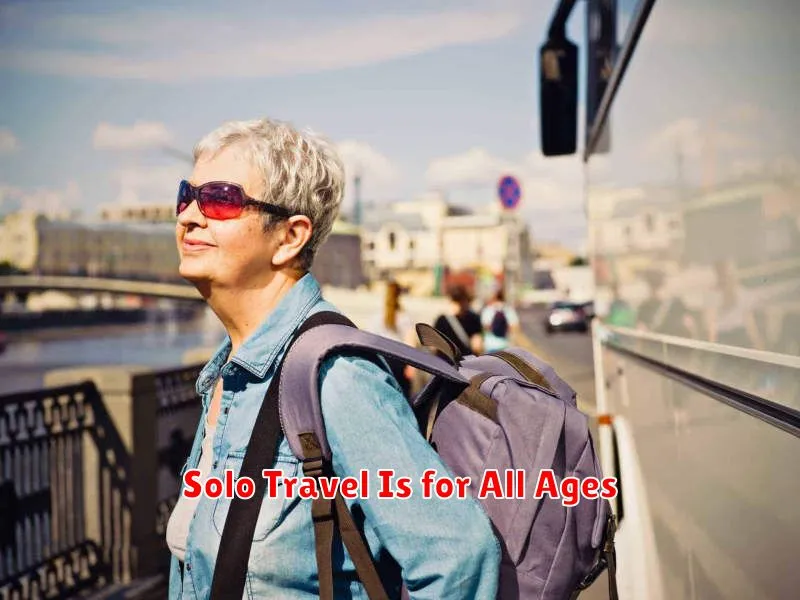Embarking on a solo travel adventure can be an incredibly enriching experience, offering unparalleled opportunities for self-discovery, independence, and exploration. However, many aspiring solo travelers are often deterred by pervasive myths and misconceptions surrounding this style of travel. These solo travel myths, frequently perpetuated by well-meaning but misinformed individuals, can paint a daunting picture of loneliness, danger, and difficulty. This article aims to debunk some of the most common solo travel myths that are not true, empowering you to take the plunge and experience the transformative power of exploring the world on your own terms.
From concerns about safety and loneliness to assumptions about cost and complexity, many of the perceived obstacles to solo travel are simply not rooted in reality. By understanding the truth behind these myths, you can confidently plan your solo trip and embrace the freedom and flexibility that comes with independent exploration. Prepare to discover the reality of solo travel and unlock a world of possibilities for your next adventure. This article will address the myths head-on, providing practical insights and real-world examples to demonstrate the truth about solo travel.
Debunking Solo Travel Misconceptions
Many aspiring solo travelers are held back by misconceptions surrounding this enriching experience. This section aims to debunk some of the most common myths, empowering you to embark on your own adventure.
Myth 1: Solo Travel is Dangerous
While safety is paramount, solo travel isn’t inherently more dangerous than traveling with others. Careful planning and responsible decision-making are key, just as they are in any travel scenario. Staying aware of your surroundings and trusting your instincts are crucial.
Myth 2: Solo Travel is Lonely
One of the biggest misconceptions is that solo travel equates to loneliness. In reality, it provides ample opportunities to connect with new people. Whether it’s striking up conversations with locals, joining group tours, or staying in social hostels, solo travel can be surprisingly social.
Myth 3: Solo Travel is Expensive
While group discounts can be appealing, solo travel offers greater flexibility in budgeting. You have complete control over your accommodation choices, dining preferences, and activity selections, allowing you to tailor your spending to your specific needs.
Solo Travel Is Not Lonely
One of the biggest misconceptions surrounding solo travel is that it equates to loneliness. This is simply not true. While traveling alone, you have the freedom to choose your own itinerary and activities. This often leads to striking up conversations with locals and other travelers, creating opportunities for meaningful connections.
Embracing solitude is different from experiencing loneliness. Solo travel provides ample opportunity for self-reflection and personal growth. It allows you to fully immerse yourself in new cultures and experiences, forming a deeper understanding of both the world and yourself. You dictate the pace, choosing when to engage with others and when to enjoy your own company.
Furthermore, in today’s connected world, staying in touch with loved ones is easier than ever. Technology allows you to share your experiences and stay connected, minimizing feelings of isolation.
You Can Be Safe Alone

One of the most pervasive myths surrounding solo travel is the idea that it’s inherently dangerous. Many assume traveling alone increases your vulnerability. However, with careful planning and smart decision-making, solo travel can be just as safe, if not safer, than traveling with others.
Personal safety is paramount, whether you’re traveling alone or in a group. Research your destination thoroughly, paying attention to any safety concerns or travel advisories. Inform someone you trust about your itinerary and check in with them regularly.
Trust your instincts. If a situation feels unsafe, remove yourself. Be aware of your surroundings and avoid walking alone late at night in unfamiliar or poorly lit areas. Utilize reliable transportation services and secure your belongings.
Being alone allows you greater flexibility to change plans if needed. This can be a significant advantage if you ever find yourself in a questionable situation. You are in control of your decisions and can quickly adapt to changing circumstances, putting your safety first.
It’s Not Just for the Rich

One of the biggest misconceptions surrounding solo travel is that it’s an exclusive activity reserved for the wealthy. This simply isn’t true. While luxurious solo trips certainly exist, budget-friendly options are abundant and accessible to most. Smart planning and resourcefulness are key to making solo travel affordable.
By leveraging resources like hostels, budget airlines, free walking tours, and local markets for meals, travelers can significantly reduce their expenses. Prioritizing experiences over luxury accommodations can also open up a world of possibilities without breaking the bank. For example, opting for a cozy guesthouse over a five-star hotel allows more funds to be allocated to exploring local culture and activities.
Furthermore, traveling during the off-season or shoulder season can result in substantial savings on flights and accommodation. Flexibility with travel dates is a powerful tool for budget-conscious solo travelers.
Solo Travel Is for All Ages

One common misconception about solo travel is that it’s only for young people. This simply isn’t true. Solo travel is an enriching experience that can be enjoyed by people of all ages, from recent graduates taking a gap year to retirees exploring the world after their careers.
While the style of solo travel might differ between age groups, the core benefits remain the same. Younger travelers might prioritize budget-friendly hostels and adventurous activities, while older travelers might opt for more comfortable accommodations and slower-paced itineraries. Regardless of age, solo travel offers the freedom to explore at your own pace, indulge your interests, and discover yourself in new ways.
Age is not a barrier. It’s about your mindset and desire to experience the world on your own terms. Whether you’re 20 or 70, the world is waiting to be explored.
You Don’t Always Need a Plan
One of the biggest misconceptions about solo travel is the necessity of meticulous planning. While having a general idea of your destination and desired activities is helpful, over-planning can stifle spontaneity and serendipity. Flexibility is key to a truly enriching solo travel experience.
Embrace the freedom to deviate from a rigid itinerary. Sometimes, the most memorable travel moments arise from unplanned detours and chance encounters. Chat with locals, follow their recommendations, and be open to changing your plans on a whim. You might discover a hidden gem or experience something entirely unexpected that becomes the highlight of your trip.
Of course, some pre-trip research is recommended, particularly concerning visas, vaccinations, and local customs. Booking accommodation in advance, especially during peak season, can also alleviate stress. However, beyond these essentials, consider leaving room for improvisation. Spontaneity can lead to incredible adventures you wouldn’t have encountered otherwise.

